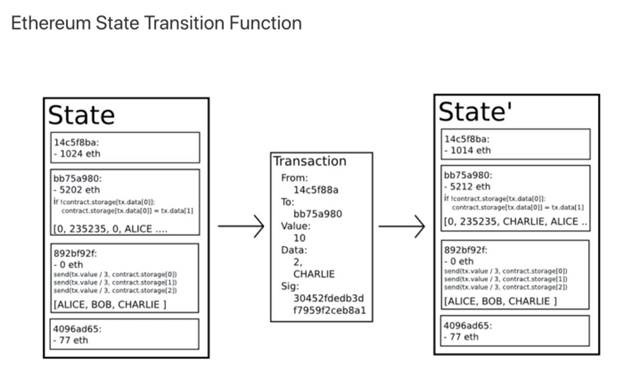|
Getting your Trinity Audio player ready...
|
This post originally appeared on Medium, and we republished with permission from its author, Xiaohui Liu.
Ethereum blockchain has been plagued by its notorious scalability issue, which is causing high fees and hindering its adoption. With Ethereum 2.0 still at least 18 months away, we propose a practical solution that works today. It is based on our previous approach to store large state inside Bitcoin efficiently.
Ethereum as a state transition system
From a technical standpoint, the ledger of a cryptocurrency such as Ethereum can be thought of as a state transition system, where there is a “state” consisting of the status of all accounts and a “state transition function” that takes a state and a transaction and outputs a new state which is the result.

Store Ethereum global state inside Bitcoin
We can develop a Bitcoin stateful smart contract, in which the state is the global state of the Ethereum blockchain. Leveraging our novel Merkle tree technique, only the Merkle root of the state has to be stored in the contract, instead of the entire Ethereum state. And only Merkle paths of a sender and a receiver are needed in each transaction. As of this writing, Ethereum has ~82 million accounts, translating to a Merkle tree of depth 27. Each Ethereum transaction can be mapped to an equivalent state mutating transaction on Bitcoin, of size in the vicinity of 10KB. With the current miner fee rate (0.5 satoshi/byte) and exchange rate ($170), this translates to a fee of less than $0.01 per transaction, which is more than 100x cheaper than Ethereum mainnet currently. As Bitcoin continues to scale, the cost of such transactions will continue dropping.
Summary
We propose a pragmatic way to solve Ethereum’s well-known scalability issue, by storing its global state in a single contract on Bitcoin. In contract with the alternative proposal of ETH 2.0, it enjoys the following salient advantages:
- It is validated by Bitcoin miners using Proof of Work and thus more secure than ETH 2.0’s Layer-2 approach.
- It is two or more orders of magnitudes cheaper.
- It is unboundedly scalable.
- It works today.
Based on these facts, we recommend Ethereum to consider migrating to Bitcoin as a strong scaling candidate.

 02-20-2026
02-20-2026 




